International Business: Culture Analysis of Australia for Tesco
VerifiedAdded on 2021/04/21
|12
|3754
|30
Report
AI Summary
This report delves into the intricacies of international business, specifically examining the cultural landscape of Australia and its implications for Tesco, a multinational grocery company. The analysis begins with an introduction to Australia as a host country, highlighting its strong economy and supportive government policies that facilitate business ventures. A detailed cultural analysis follows, exploring Australia's unique blend of Western and British influences, its diverse population, and its core values such as equality and freedom. The report further investigates the business culture of Australia, emphasizing its focus on consensus, result-oriented decision-making, and the importance of personal relationships. A comparison between Australian and Singaporean business environments highlights key differences in areas like infrastructure, taxation, and government efficiency. The report also applies Hofstede's cultural dimensions to understand societal values and their impact on business operations. The report concludes by suggesting the joint venture as the best entry mode for Tesco to expand its business activities in Australia, given the country's attractive foreign direct investment opportunities and strong work ethic.
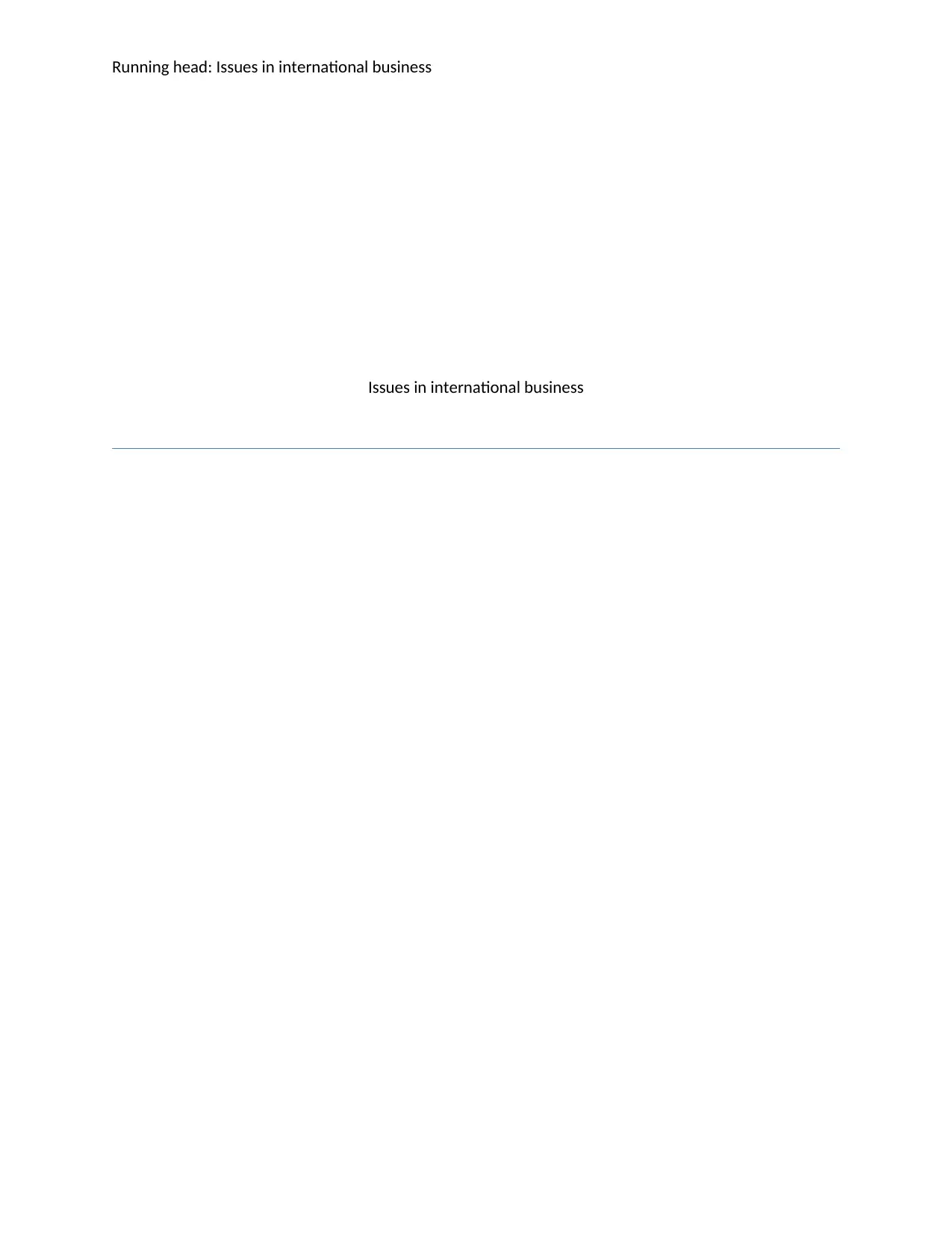
Running head: Issues in international business
Issues in international business
Issues in international business
Paraphrase This Document
Need a fresh take? Get an instant paraphrase of this document with our AI Paraphraser
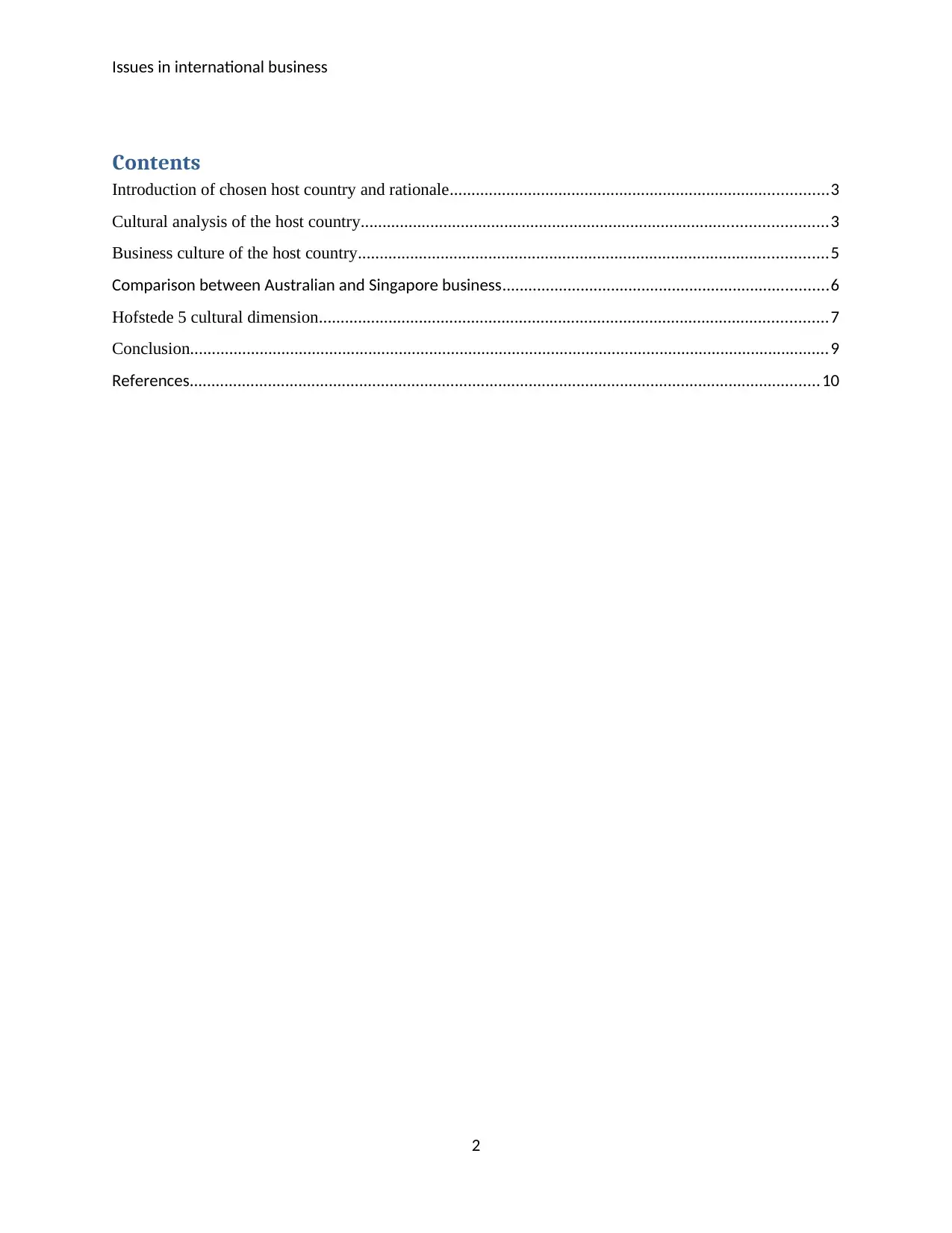
Issues in international business
Contents
Introduction of chosen host country and rationale.......................................................................................3
Cultural analysis of the host country...........................................................................................................3
Business culture of the host country............................................................................................................5
Comparison between Australian and Singapore business...........................................................................6
Hofstede 5 cultural dimension.....................................................................................................................7
Conclusion...................................................................................................................................................9
References.................................................................................................................................................10
2
Contents
Introduction of chosen host country and rationale.......................................................................................3
Cultural analysis of the host country...........................................................................................................3
Business culture of the host country............................................................................................................5
Comparison between Australian and Singapore business...........................................................................6
Hofstede 5 cultural dimension.....................................................................................................................7
Conclusion...................................................................................................................................................9
References.................................................................................................................................................10
2
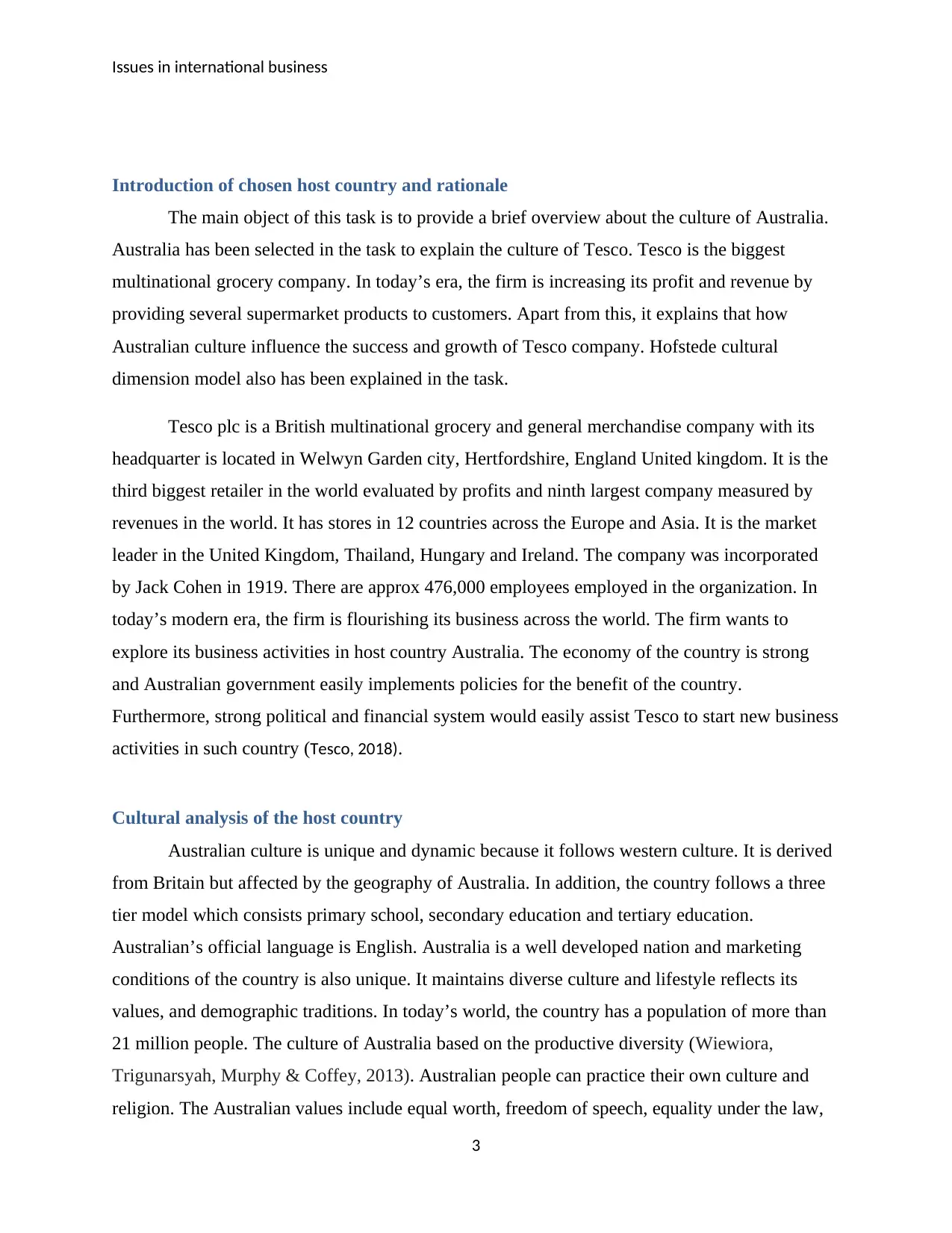
Issues in international business
Introduction of chosen host country and rationale
The main object of this task is to provide a brief overview about the culture of Australia.
Australia has been selected in the task to explain the culture of Tesco. Tesco is the biggest
multinational grocery company. In today’s era, the firm is increasing its profit and revenue by
providing several supermarket products to customers. Apart from this, it explains that how
Australian culture influence the success and growth of Tesco company. Hofstede cultural
dimension model also has been explained in the task.
Tesco plc is a British multinational grocery and general merchandise company with its
headquarter is located in Welwyn Garden city, Hertfordshire, England United kingdom. It is the
third biggest retailer in the world evaluated by profits and ninth largest company measured by
revenues in the world. It has stores in 12 countries across the Europe and Asia. It is the market
leader in the United Kingdom, Thailand, Hungary and Ireland. The company was incorporated
by Jack Cohen in 1919. There are approx 476,000 employees employed in the organization. In
today’s modern era, the firm is flourishing its business across the world. The firm wants to
explore its business activities in host country Australia. The economy of the country is strong
and Australian government easily implements policies for the benefit of the country.
Furthermore, strong political and financial system would easily assist Tesco to start new business
activities in such country (Tesco, 2018).
Cultural analysis of the host country
Australian culture is unique and dynamic because it follows western culture. It is derived
from Britain but affected by the geography of Australia. In addition, the country follows a three
tier model which consists primary school, secondary education and tertiary education.
Australian’s official language is English. Australia is a well developed nation and marketing
conditions of the country is also unique. It maintains diverse culture and lifestyle reflects its
values, and demographic traditions. In today’s world, the country has a population of more than
21 million people. The culture of Australia based on the productive diversity (Wiewiora,
Trigunarsyah, Murphy & Coffey, 2013). Australian people can practice their own culture and
religion. The Australian values include equal worth, freedom of speech, equality under the law,
3
Introduction of chosen host country and rationale
The main object of this task is to provide a brief overview about the culture of Australia.
Australia has been selected in the task to explain the culture of Tesco. Tesco is the biggest
multinational grocery company. In today’s era, the firm is increasing its profit and revenue by
providing several supermarket products to customers. Apart from this, it explains that how
Australian culture influence the success and growth of Tesco company. Hofstede cultural
dimension model also has been explained in the task.
Tesco plc is a British multinational grocery and general merchandise company with its
headquarter is located in Welwyn Garden city, Hertfordshire, England United kingdom. It is the
third biggest retailer in the world evaluated by profits and ninth largest company measured by
revenues in the world. It has stores in 12 countries across the Europe and Asia. It is the market
leader in the United Kingdom, Thailand, Hungary and Ireland. The company was incorporated
by Jack Cohen in 1919. There are approx 476,000 employees employed in the organization. In
today’s modern era, the firm is flourishing its business across the world. The firm wants to
explore its business activities in host country Australia. The economy of the country is strong
and Australian government easily implements policies for the benefit of the country.
Furthermore, strong political and financial system would easily assist Tesco to start new business
activities in such country (Tesco, 2018).
Cultural analysis of the host country
Australian culture is unique and dynamic because it follows western culture. It is derived
from Britain but affected by the geography of Australia. In addition, the country follows a three
tier model which consists primary school, secondary education and tertiary education.
Australian’s official language is English. Australia is a well developed nation and marketing
conditions of the country is also unique. It maintains diverse culture and lifestyle reflects its
values, and demographic traditions. In today’s world, the country has a population of more than
21 million people. The culture of Australia based on the productive diversity (Wiewiora,
Trigunarsyah, Murphy & Coffey, 2013). Australian people can practice their own culture and
religion. The Australian values include equal worth, freedom of speech, equality under the law,
3
⊘ This is a preview!⊘
Do you want full access?
Subscribe today to unlock all pages.

Trusted by 1+ million students worldwide
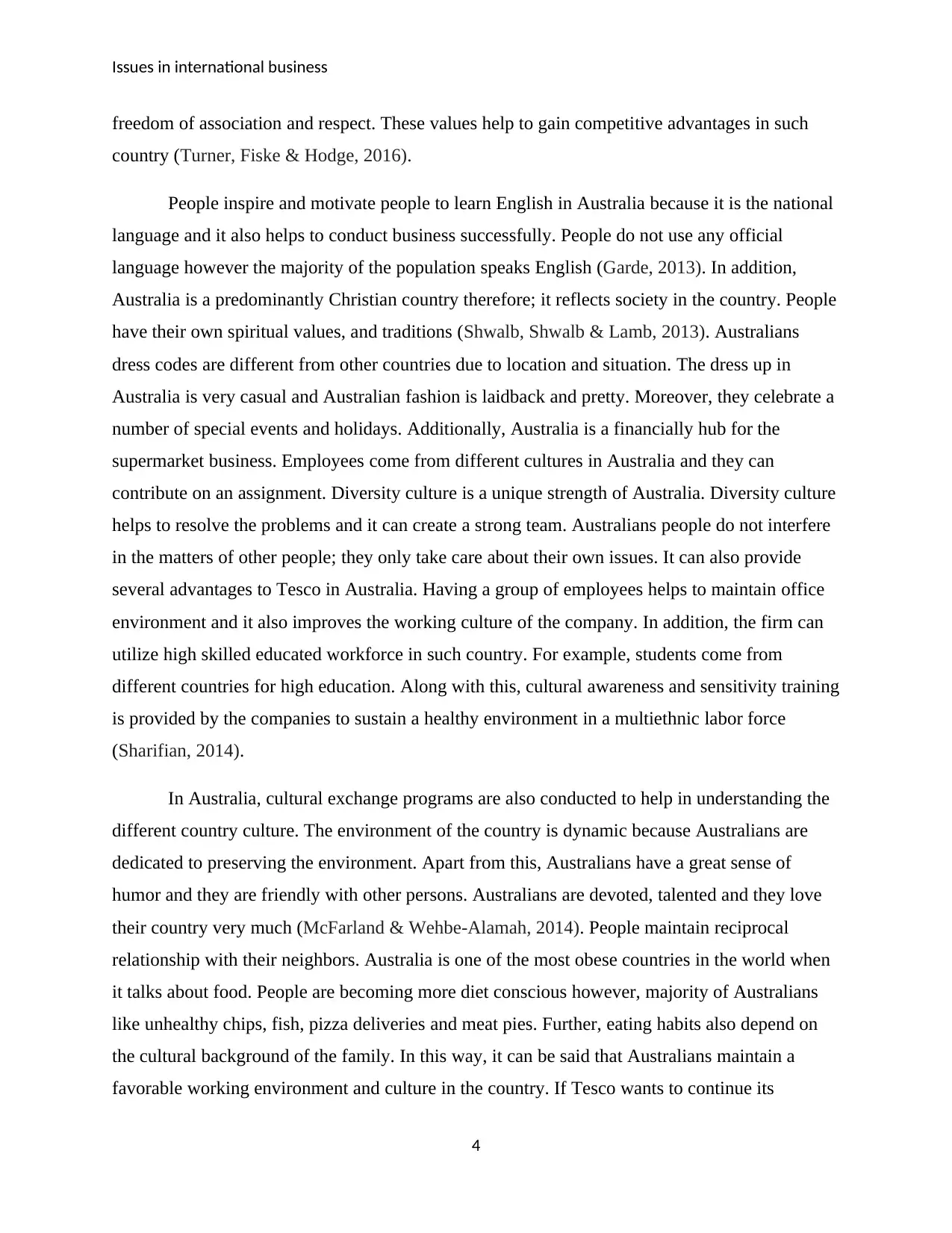
Issues in international business
freedom of association and respect. These values help to gain competitive advantages in such
country (Turner, Fiske & Hodge, 2016).
People inspire and motivate people to learn English in Australia because it is the national
language and it also helps to conduct business successfully. People do not use any official
language however the majority of the population speaks English (Garde, 2013). In addition,
Australia is a predominantly Christian country therefore; it reflects society in the country. People
have their own spiritual values, and traditions (Shwalb, Shwalb & Lamb, 2013). Australians
dress codes are different from other countries due to location and situation. The dress up in
Australia is very casual and Australian fashion is laidback and pretty. Moreover, they celebrate a
number of special events and holidays. Additionally, Australia is a financially hub for the
supermarket business. Employees come from different cultures in Australia and they can
contribute on an assignment. Diversity culture is a unique strength of Australia. Diversity culture
helps to resolve the problems and it can create a strong team. Australians people do not interfere
in the matters of other people; they only take care about their own issues. It can also provide
several advantages to Tesco in Australia. Having a group of employees helps to maintain office
environment and it also improves the working culture of the company. In addition, the firm can
utilize high skilled educated workforce in such country. For example, students come from
different countries for high education. Along with this, cultural awareness and sensitivity training
is provided by the companies to sustain a healthy environment in a multiethnic labor force
(Sharifian, 2014).
In Australia, cultural exchange programs are also conducted to help in understanding the
different country culture. The environment of the country is dynamic because Australians are
dedicated to preserving the environment. Apart from this, Australians have a great sense of
humor and they are friendly with other persons. Australians are devoted, talented and they love
their country very much (McFarland & Wehbe-Alamah, 2014). People maintain reciprocal
relationship with their neighbors. Australia is one of the most obese countries in the world when
it talks about food. People are becoming more diet conscious however, majority of Australians
like unhealthy chips, fish, pizza deliveries and meat pies. Further, eating habits also depend on
the cultural background of the family. In this way, it can be said that Australians maintain a
favorable working environment and culture in the country. If Tesco wants to continue its
4
freedom of association and respect. These values help to gain competitive advantages in such
country (Turner, Fiske & Hodge, 2016).
People inspire and motivate people to learn English in Australia because it is the national
language and it also helps to conduct business successfully. People do not use any official
language however the majority of the population speaks English (Garde, 2013). In addition,
Australia is a predominantly Christian country therefore; it reflects society in the country. People
have their own spiritual values, and traditions (Shwalb, Shwalb & Lamb, 2013). Australians
dress codes are different from other countries due to location and situation. The dress up in
Australia is very casual and Australian fashion is laidback and pretty. Moreover, they celebrate a
number of special events and holidays. Additionally, Australia is a financially hub for the
supermarket business. Employees come from different cultures in Australia and they can
contribute on an assignment. Diversity culture is a unique strength of Australia. Diversity culture
helps to resolve the problems and it can create a strong team. Australians people do not interfere
in the matters of other people; they only take care about their own issues. It can also provide
several advantages to Tesco in Australia. Having a group of employees helps to maintain office
environment and it also improves the working culture of the company. In addition, the firm can
utilize high skilled educated workforce in such country. For example, students come from
different countries for high education. Along with this, cultural awareness and sensitivity training
is provided by the companies to sustain a healthy environment in a multiethnic labor force
(Sharifian, 2014).
In Australia, cultural exchange programs are also conducted to help in understanding the
different country culture. The environment of the country is dynamic because Australians are
dedicated to preserving the environment. Apart from this, Australians have a great sense of
humor and they are friendly with other persons. Australians are devoted, talented and they love
their country very much (McFarland & Wehbe-Alamah, 2014). People maintain reciprocal
relationship with their neighbors. Australia is one of the most obese countries in the world when
it talks about food. People are becoming more diet conscious however, majority of Australians
like unhealthy chips, fish, pizza deliveries and meat pies. Further, eating habits also depend on
the cultural background of the family. In this way, it can be said that Australians maintain a
favorable working environment and culture in the country. If Tesco wants to continue its
4
Paraphrase This Document
Need a fresh take? Get an instant paraphrase of this document with our AI Paraphraser
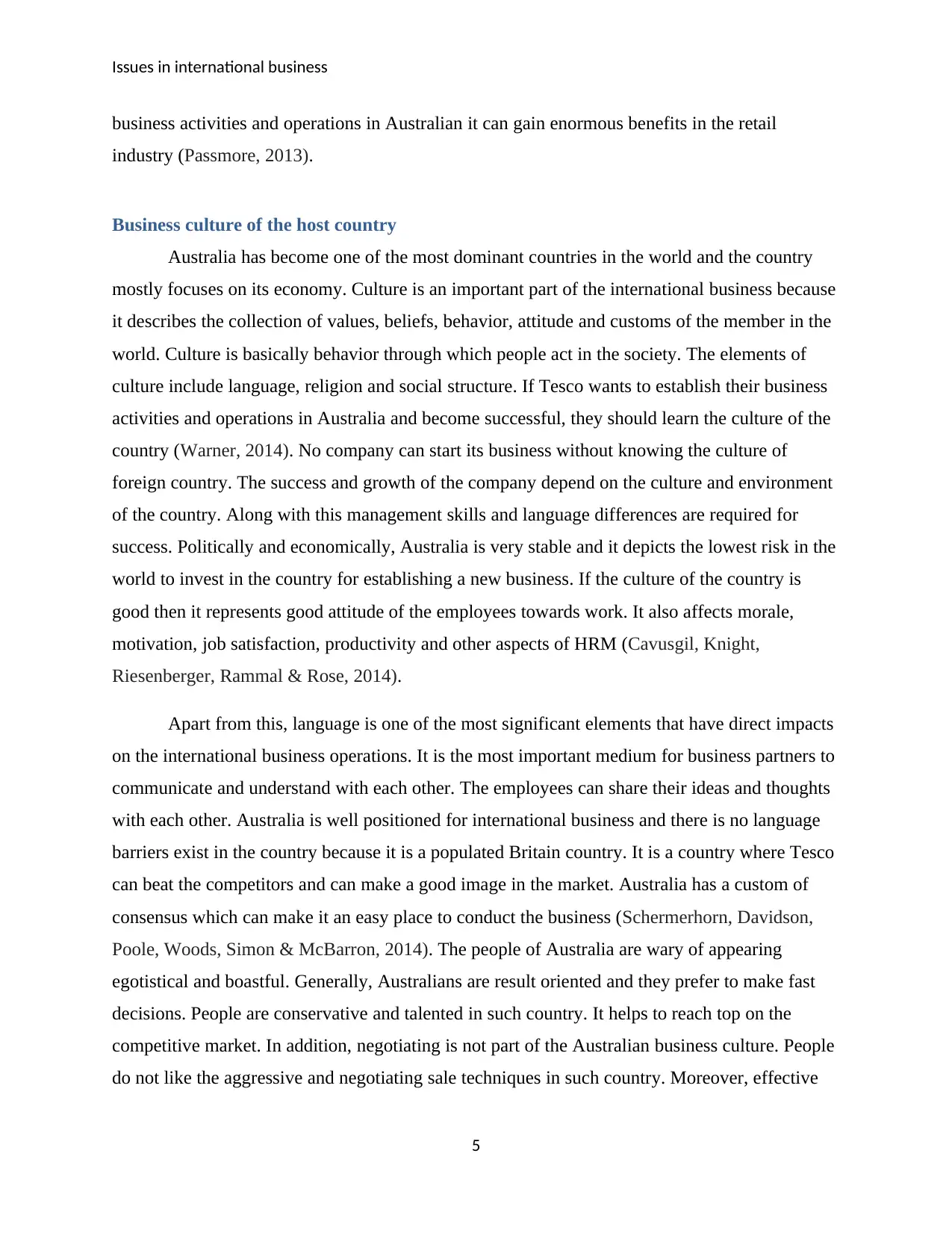
Issues in international business
business activities and operations in Australian it can gain enormous benefits in the retail
industry (Passmore, 2013).
Business culture of the host country
Australia has become one of the most dominant countries in the world and the country
mostly focuses on its economy. Culture is an important part of the international business because
it describes the collection of values, beliefs, behavior, attitude and customs of the member in the
world. Culture is basically behavior through which people act in the society. The elements of
culture include language, religion and social structure. If Tesco wants to establish their business
activities and operations in Australia and become successful, they should learn the culture of the
country (Warner, 2014). No company can start its business without knowing the culture of
foreign country. The success and growth of the company depend on the culture and environment
of the country. Along with this management skills and language differences are required for
success. Politically and economically, Australia is very stable and it depicts the lowest risk in the
world to invest in the country for establishing a new business. If the culture of the country is
good then it represents good attitude of the employees towards work. It also affects morale,
motivation, job satisfaction, productivity and other aspects of HRM (Cavusgil, Knight,
Riesenberger, Rammal & Rose, 2014).
Apart from this, language is one of the most significant elements that have direct impacts
on the international business operations. It is the most important medium for business partners to
communicate and understand with each other. The employees can share their ideas and thoughts
with each other. Australia is well positioned for international business and there is no language
barriers exist in the country because it is a populated Britain country. It is a country where Tesco
can beat the competitors and can make a good image in the market. Australia has a custom of
consensus which can make it an easy place to conduct the business (Schermerhorn, Davidson,
Poole, Woods, Simon & McBarron, 2014). The people of Australia are wary of appearing
egotistical and boastful. Generally, Australians are result oriented and they prefer to make fast
decisions. People are conservative and talented in such country. It helps to reach top on the
competitive market. In addition, negotiating is not part of the Australian business culture. People
do not like the aggressive and negotiating sale techniques in such country. Moreover, effective
5
business activities and operations in Australian it can gain enormous benefits in the retail
industry (Passmore, 2013).
Business culture of the host country
Australia has become one of the most dominant countries in the world and the country
mostly focuses on its economy. Culture is an important part of the international business because
it describes the collection of values, beliefs, behavior, attitude and customs of the member in the
world. Culture is basically behavior through which people act in the society. The elements of
culture include language, religion and social structure. If Tesco wants to establish their business
activities and operations in Australia and become successful, they should learn the culture of the
country (Warner, 2014). No company can start its business without knowing the culture of
foreign country. The success and growth of the company depend on the culture and environment
of the country. Along with this management skills and language differences are required for
success. Politically and economically, Australia is very stable and it depicts the lowest risk in the
world to invest in the country for establishing a new business. If the culture of the country is
good then it represents good attitude of the employees towards work. It also affects morale,
motivation, job satisfaction, productivity and other aspects of HRM (Cavusgil, Knight,
Riesenberger, Rammal & Rose, 2014).
Apart from this, language is one of the most significant elements that have direct impacts
on the international business operations. It is the most important medium for business partners to
communicate and understand with each other. The employees can share their ideas and thoughts
with each other. Australia is well positioned for international business and there is no language
barriers exist in the country because it is a populated Britain country. It is a country where Tesco
can beat the competitors and can make a good image in the market. Australia has a custom of
consensus which can make it an easy place to conduct the business (Schermerhorn, Davidson,
Poole, Woods, Simon & McBarron, 2014). The people of Australia are wary of appearing
egotistical and boastful. Generally, Australians are result oriented and they prefer to make fast
decisions. People are conservative and talented in such country. It helps to reach top on the
competitive market. In addition, negotiating is not part of the Australian business culture. People
do not like the aggressive and negotiating sale techniques in such country. Moreover, effective
5
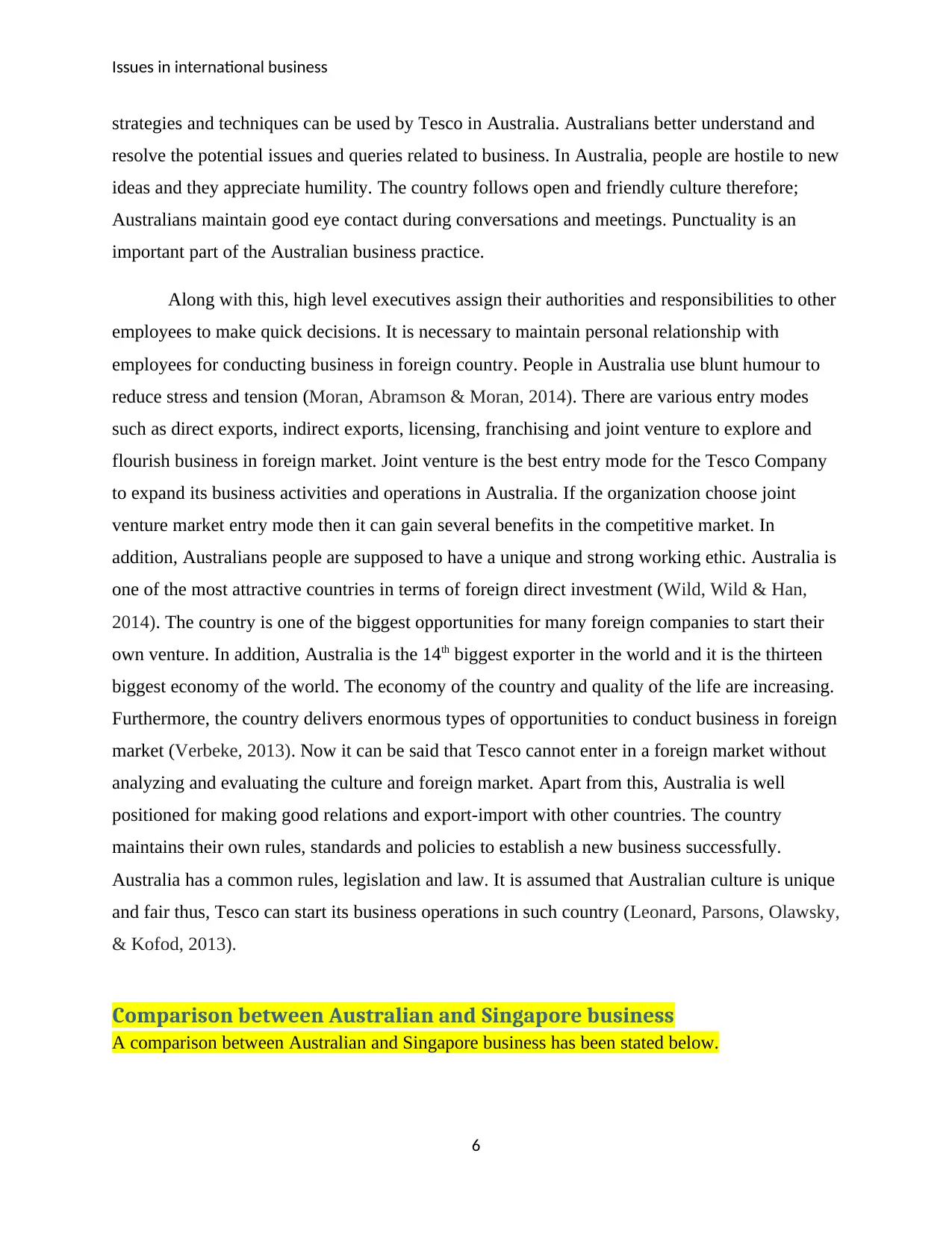
Issues in international business
strategies and techniques can be used by Tesco in Australia. Australians better understand and
resolve the potential issues and queries related to business. In Australia, people are hostile to new
ideas and they appreciate humility. The country follows open and friendly culture therefore;
Australians maintain good eye contact during conversations and meetings. Punctuality is an
important part of the Australian business practice.
Along with this, high level executives assign their authorities and responsibilities to other
employees to make quick decisions. It is necessary to maintain personal relationship with
employees for conducting business in foreign country. People in Australia use blunt humour to
reduce stress and tension (Moran, Abramson & Moran, 2014). There are various entry modes
such as direct exports, indirect exports, licensing, franchising and joint venture to explore and
flourish business in foreign market. Joint venture is the best entry mode for the Tesco Company
to expand its business activities and operations in Australia. If the organization choose joint
venture market entry mode then it can gain several benefits in the competitive market. In
addition, Australians people are supposed to have a unique and strong working ethic. Australia is
one of the most attractive countries in terms of foreign direct investment (Wild, Wild & Han,
2014). The country is one of the biggest opportunities for many foreign companies to start their
own venture. In addition, Australia is the 14th biggest exporter in the world and it is the thirteen
biggest economy of the world. The economy of the country and quality of the life are increasing.
Furthermore, the country delivers enormous types of opportunities to conduct business in foreign
market (Verbeke, 2013). Now it can be said that Tesco cannot enter in a foreign market without
analyzing and evaluating the culture and foreign market. Apart from this, Australia is well
positioned for making good relations and export-import with other countries. The country
maintains their own rules, standards and policies to establish a new business successfully.
Australia has a common rules, legislation and law. It is assumed that Australian culture is unique
and fair thus, Tesco can start its business operations in such country (Leonard, Parsons, Olawsky,
& Kofod, 2013).
Comparison between Australian and Singapore business
A comparison between Australian and Singapore business has been stated below.
6
strategies and techniques can be used by Tesco in Australia. Australians better understand and
resolve the potential issues and queries related to business. In Australia, people are hostile to new
ideas and they appreciate humility. The country follows open and friendly culture therefore;
Australians maintain good eye contact during conversations and meetings. Punctuality is an
important part of the Australian business practice.
Along with this, high level executives assign their authorities and responsibilities to other
employees to make quick decisions. It is necessary to maintain personal relationship with
employees for conducting business in foreign country. People in Australia use blunt humour to
reduce stress and tension (Moran, Abramson & Moran, 2014). There are various entry modes
such as direct exports, indirect exports, licensing, franchising and joint venture to explore and
flourish business in foreign market. Joint venture is the best entry mode for the Tesco Company
to expand its business activities and operations in Australia. If the organization choose joint
venture market entry mode then it can gain several benefits in the competitive market. In
addition, Australians people are supposed to have a unique and strong working ethic. Australia is
one of the most attractive countries in terms of foreign direct investment (Wild, Wild & Han,
2014). The country is one of the biggest opportunities for many foreign companies to start their
own venture. In addition, Australia is the 14th biggest exporter in the world and it is the thirteen
biggest economy of the world. The economy of the country and quality of the life are increasing.
Furthermore, the country delivers enormous types of opportunities to conduct business in foreign
market (Verbeke, 2013). Now it can be said that Tesco cannot enter in a foreign market without
analyzing and evaluating the culture and foreign market. Apart from this, Australia is well
positioned for making good relations and export-import with other countries. The country
maintains their own rules, standards and policies to establish a new business successfully.
Australia has a common rules, legislation and law. It is assumed that Australian culture is unique
and fair thus, Tesco can start its business operations in such country (Leonard, Parsons, Olawsky,
& Kofod, 2013).
Comparison between Australian and Singapore business
A comparison between Australian and Singapore business has been stated below.
6
⊘ This is a preview!⊘
Do you want full access?
Subscribe today to unlock all pages.

Trusted by 1+ million students worldwide
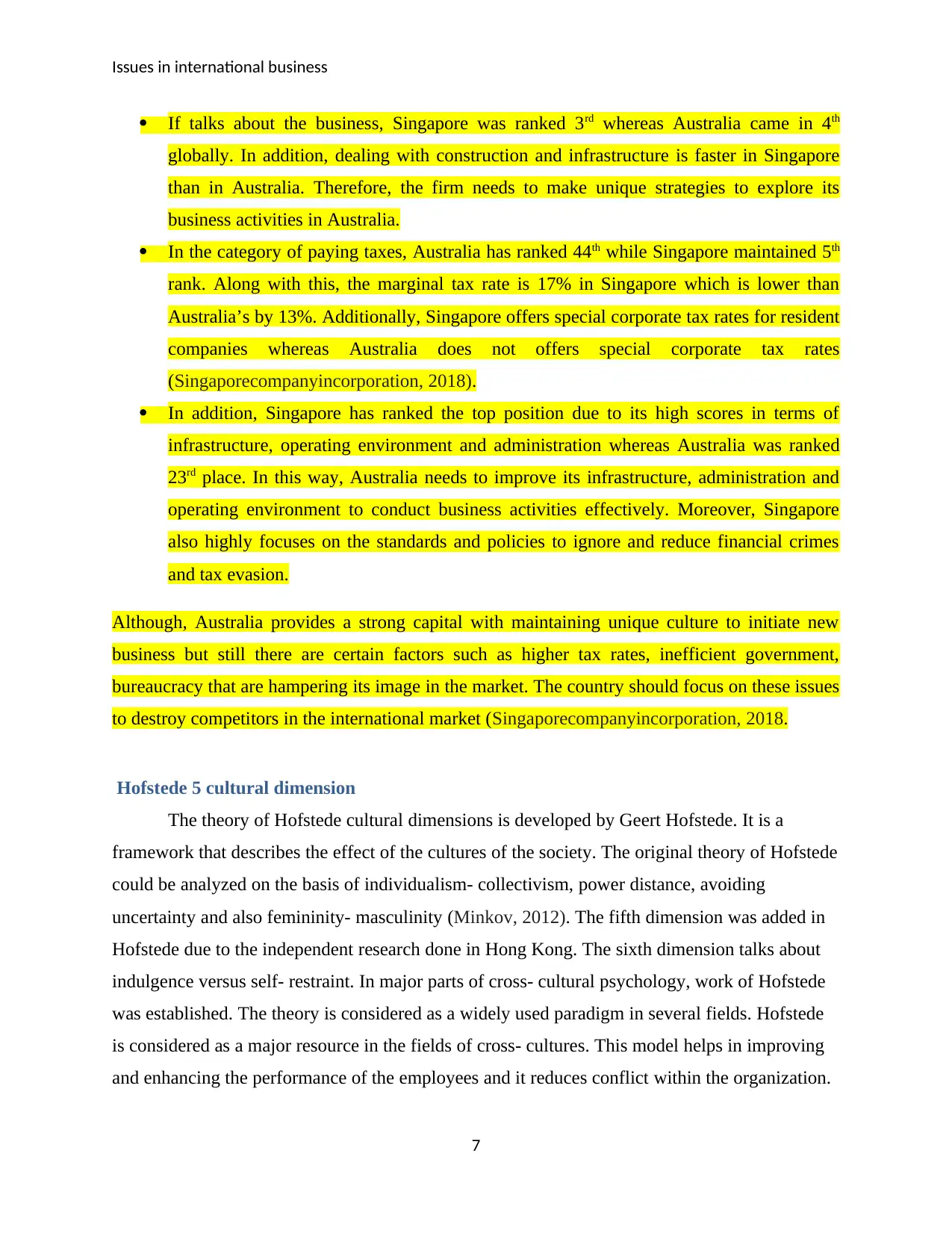
Issues in international business
If talks about the business, Singapore was ranked 3rd whereas Australia came in 4th
globally. In addition, dealing with construction and infrastructure is faster in Singapore
than in Australia. Therefore, the firm needs to make unique strategies to explore its
business activities in Australia.
In the category of paying taxes, Australia has ranked 44th while Singapore maintained 5th
rank. Along with this, the marginal tax rate is 17% in Singapore which is lower than
Australia’s by 13%. Additionally, Singapore offers special corporate tax rates for resident
companies whereas Australia does not offers special corporate tax rates
(Singaporecompanyincorporation, 2018).
In addition, Singapore has ranked the top position due to its high scores in terms of
infrastructure, operating environment and administration whereas Australia was ranked
23rd place. In this way, Australia needs to improve its infrastructure, administration and
operating environment to conduct business activities effectively. Moreover, Singapore
also highly focuses on the standards and policies to ignore and reduce financial crimes
and tax evasion.
Although, Australia provides a strong capital with maintaining unique culture to initiate new
business but still there are certain factors such as higher tax rates, inefficient government,
bureaucracy that are hampering its image in the market. The country should focus on these issues
to destroy competitors in the international market (Singaporecompanyincorporation, 2018.
Hofstede 5 cultural dimension
The theory of Hofstede cultural dimensions is developed by Geert Hofstede. It is a
framework that describes the effect of the cultures of the society. The original theory of Hofstede
could be analyzed on the basis of individualism- collectivism, power distance, avoiding
uncertainty and also femininity- masculinity (Minkov, 2012). The fifth dimension was added in
Hofstede due to the independent research done in Hong Kong. The sixth dimension talks about
indulgence versus self- restraint. In major parts of cross- cultural psychology, work of Hofstede
was established. The theory is considered as a widely used paradigm in several fields. Hofstede
is considered as a major resource in the fields of cross- cultures. This model helps in improving
and enhancing the performance of the employees and it reduces conflict within the organization.
7
If talks about the business, Singapore was ranked 3rd whereas Australia came in 4th
globally. In addition, dealing with construction and infrastructure is faster in Singapore
than in Australia. Therefore, the firm needs to make unique strategies to explore its
business activities in Australia.
In the category of paying taxes, Australia has ranked 44th while Singapore maintained 5th
rank. Along with this, the marginal tax rate is 17% in Singapore which is lower than
Australia’s by 13%. Additionally, Singapore offers special corporate tax rates for resident
companies whereas Australia does not offers special corporate tax rates
(Singaporecompanyincorporation, 2018).
In addition, Singapore has ranked the top position due to its high scores in terms of
infrastructure, operating environment and administration whereas Australia was ranked
23rd place. In this way, Australia needs to improve its infrastructure, administration and
operating environment to conduct business activities effectively. Moreover, Singapore
also highly focuses on the standards and policies to ignore and reduce financial crimes
and tax evasion.
Although, Australia provides a strong capital with maintaining unique culture to initiate new
business but still there are certain factors such as higher tax rates, inefficient government,
bureaucracy that are hampering its image in the market. The country should focus on these issues
to destroy competitors in the international market (Singaporecompanyincorporation, 2018.
Hofstede 5 cultural dimension
The theory of Hofstede cultural dimensions is developed by Geert Hofstede. It is a
framework that describes the effect of the cultures of the society. The original theory of Hofstede
could be analyzed on the basis of individualism- collectivism, power distance, avoiding
uncertainty and also femininity- masculinity (Minkov, 2012). The fifth dimension was added in
Hofstede due to the independent research done in Hong Kong. The sixth dimension talks about
indulgence versus self- restraint. In major parts of cross- cultural psychology, work of Hofstede
was established. The theory is considered as a widely used paradigm in several fields. Hofstede
is considered as a major resource in the fields of cross- cultures. This model helps in improving
and enhancing the performance of the employees and it reduces conflict within the organization.
7
Paraphrase This Document
Need a fresh take? Get an instant paraphrase of this document with our AI Paraphraser
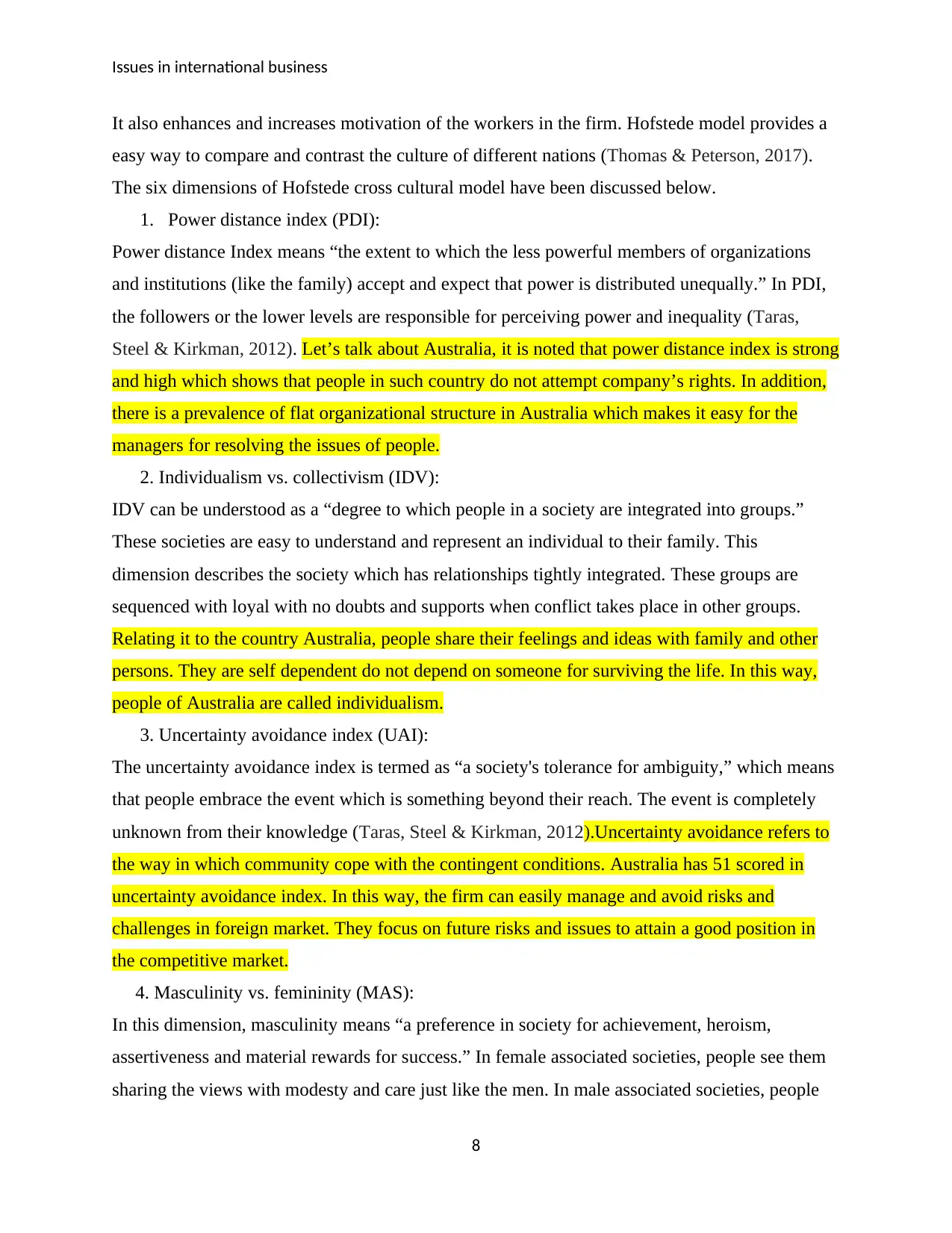
Issues in international business
It also enhances and increases motivation of the workers in the firm. Hofstede model provides a
easy way to compare and contrast the culture of different nations (Thomas & Peterson, 2017).
The six dimensions of Hofstede cross cultural model have been discussed below.
1. Power distance index (PDI):
Power distance Index means “the extent to which the less powerful members of organizations
and institutions (like the family) accept and expect that power is distributed unequally.” In PDI,
the followers or the lower levels are responsible for perceiving power and inequality (Taras,
Steel & Kirkman, 2012). Let’s talk about Australia, it is noted that power distance index is strong
and high which shows that people in such country do not attempt company’s rights. In addition,
there is a prevalence of flat organizational structure in Australia which makes it easy for the
managers for resolving the issues of people.
2. Individualism vs. collectivism (IDV):
IDV can be understood as a “degree to which people in a society are integrated into groups.”
These societies are easy to understand and represent an individual to their family. This
dimension describes the society which has relationships tightly integrated. These groups are
sequenced with loyal with no doubts and supports when conflict takes place in other groups.
Relating it to the country Australia, people share their feelings and ideas with family and other
persons. They are self dependent do not depend on someone for surviving the life. In this way,
people of Australia are called individualism.
3. Uncertainty avoidance index (UAI):
The uncertainty avoidance index is termed as “a society's tolerance for ambiguity,” which means
that people embrace the event which is something beyond their reach. The event is completely
unknown from their knowledge (Taras, Steel & Kirkman, 2012).Uncertainty avoidance refers to
the way in which community cope with the contingent conditions. Australia has 51 scored in
uncertainty avoidance index. In this way, the firm can easily manage and avoid risks and
challenges in foreign market. They focus on future risks and issues to attain a good position in
the competitive market.
4. Masculinity vs. femininity (MAS):
In this dimension, masculinity means “a preference in society for achievement, heroism,
assertiveness and material rewards for success.” In female associated societies, people see them
sharing the views with modesty and care just like the men. In male associated societies, people
8
It also enhances and increases motivation of the workers in the firm. Hofstede model provides a
easy way to compare and contrast the culture of different nations (Thomas & Peterson, 2017).
The six dimensions of Hofstede cross cultural model have been discussed below.
1. Power distance index (PDI):
Power distance Index means “the extent to which the less powerful members of organizations
and institutions (like the family) accept and expect that power is distributed unequally.” In PDI,
the followers or the lower levels are responsible for perceiving power and inequality (Taras,
Steel & Kirkman, 2012). Let’s talk about Australia, it is noted that power distance index is strong
and high which shows that people in such country do not attempt company’s rights. In addition,
there is a prevalence of flat organizational structure in Australia which makes it easy for the
managers for resolving the issues of people.
2. Individualism vs. collectivism (IDV):
IDV can be understood as a “degree to which people in a society are integrated into groups.”
These societies are easy to understand and represent an individual to their family. This
dimension describes the society which has relationships tightly integrated. These groups are
sequenced with loyal with no doubts and supports when conflict takes place in other groups.
Relating it to the country Australia, people share their feelings and ideas with family and other
persons. They are self dependent do not depend on someone for surviving the life. In this way,
people of Australia are called individualism.
3. Uncertainty avoidance index (UAI):
The uncertainty avoidance index is termed as “a society's tolerance for ambiguity,” which means
that people embrace the event which is something beyond their reach. The event is completely
unknown from their knowledge (Taras, Steel & Kirkman, 2012).Uncertainty avoidance refers to
the way in which community cope with the contingent conditions. Australia has 51 scored in
uncertainty avoidance index. In this way, the firm can easily manage and avoid risks and
challenges in foreign market. They focus on future risks and issues to attain a good position in
the competitive market.
4. Masculinity vs. femininity (MAS):
In this dimension, masculinity means “a preference in society for achievement, heroism,
assertiveness and material rewards for success.” In female associated societies, people see them
sharing the views with modesty and care just like the men. In male associated societies, people
8
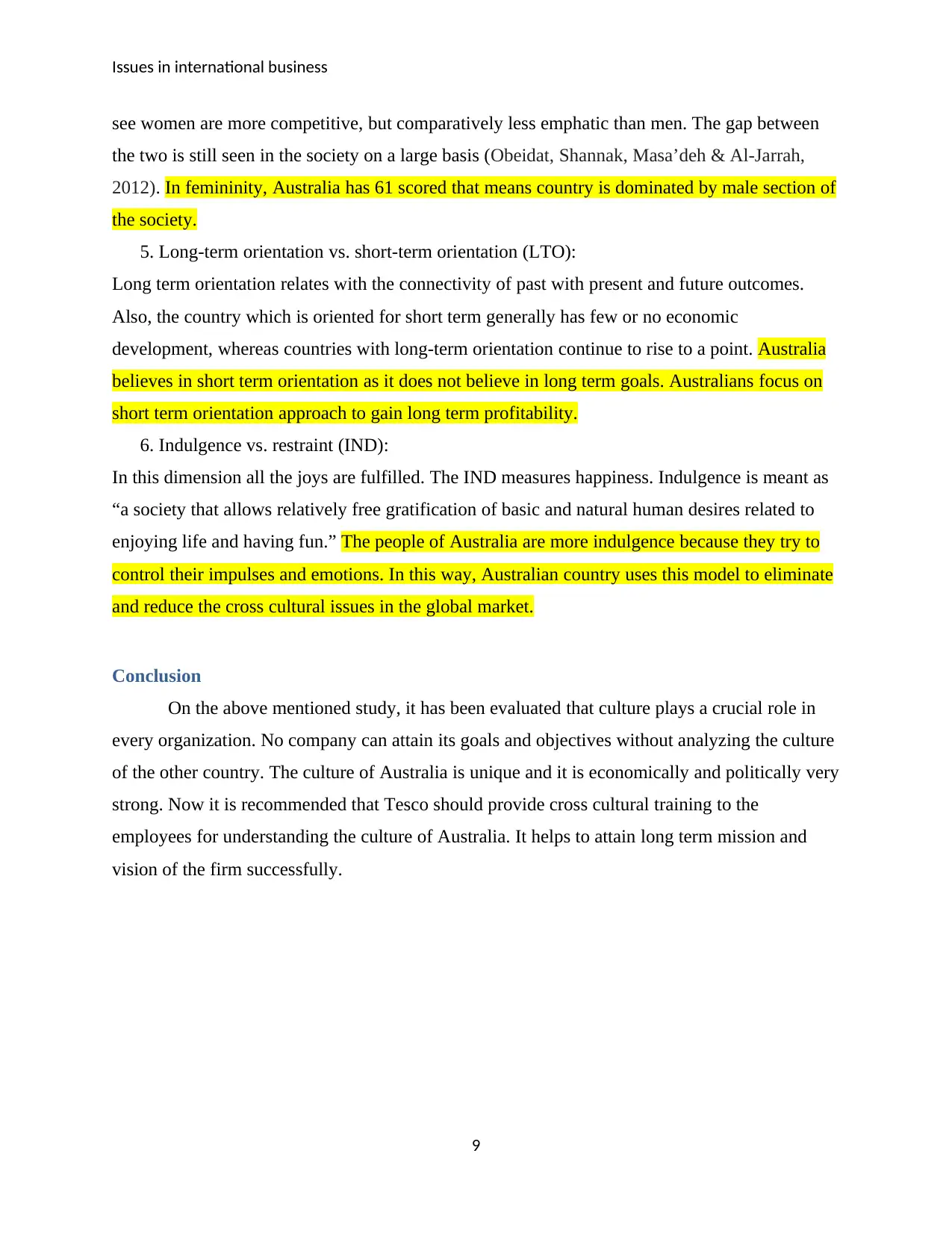
Issues in international business
see women are more competitive, but comparatively less emphatic than men. The gap between
the two is still seen in the society on a large basis (Obeidat, Shannak, Masa’deh & Al-Jarrah,
2012). In femininity, Australia has 61 scored that means country is dominated by male section of
the society.
5. Long-term orientation vs. short-term orientation (LTO):
Long term orientation relates with the connectivity of past with present and future outcomes.
Also, the country which is oriented for short term generally has few or no economic
development, whereas countries with long-term orientation continue to rise to a point. Australia
believes in short term orientation as it does not believe in long term goals. Australians focus on
short term orientation approach to gain long term profitability.
6. Indulgence vs. restraint (IND):
In this dimension all the joys are fulfilled. The IND measures happiness. Indulgence is meant as
“a society that allows relatively free gratification of basic and natural human desires related to
enjoying life and having fun.” The people of Australia are more indulgence because they try to
control their impulses and emotions. In this way, Australian country uses this model to eliminate
and reduce the cross cultural issues in the global market.
Conclusion
On the above mentioned study, it has been evaluated that culture plays a crucial role in
every organization. No company can attain its goals and objectives without analyzing the culture
of the other country. The culture of Australia is unique and it is economically and politically very
strong. Now it is recommended that Tesco should provide cross cultural training to the
employees for understanding the culture of Australia. It helps to attain long term mission and
vision of the firm successfully.
9
see women are more competitive, but comparatively less emphatic than men. The gap between
the two is still seen in the society on a large basis (Obeidat, Shannak, Masa’deh & Al-Jarrah,
2012). In femininity, Australia has 61 scored that means country is dominated by male section of
the society.
5. Long-term orientation vs. short-term orientation (LTO):
Long term orientation relates with the connectivity of past with present and future outcomes.
Also, the country which is oriented for short term generally has few or no economic
development, whereas countries with long-term orientation continue to rise to a point. Australia
believes in short term orientation as it does not believe in long term goals. Australians focus on
short term orientation approach to gain long term profitability.
6. Indulgence vs. restraint (IND):
In this dimension all the joys are fulfilled. The IND measures happiness. Indulgence is meant as
“a society that allows relatively free gratification of basic and natural human desires related to
enjoying life and having fun.” The people of Australia are more indulgence because they try to
control their impulses and emotions. In this way, Australian country uses this model to eliminate
and reduce the cross cultural issues in the global market.
Conclusion
On the above mentioned study, it has been evaluated that culture plays a crucial role in
every organization. No company can attain its goals and objectives without analyzing the culture
of the other country. The culture of Australia is unique and it is economically and politically very
strong. Now it is recommended that Tesco should provide cross cultural training to the
employees for understanding the culture of Australia. It helps to attain long term mission and
vision of the firm successfully.
9
⊘ This is a preview!⊘
Do you want full access?
Subscribe today to unlock all pages.

Trusted by 1+ million students worldwide
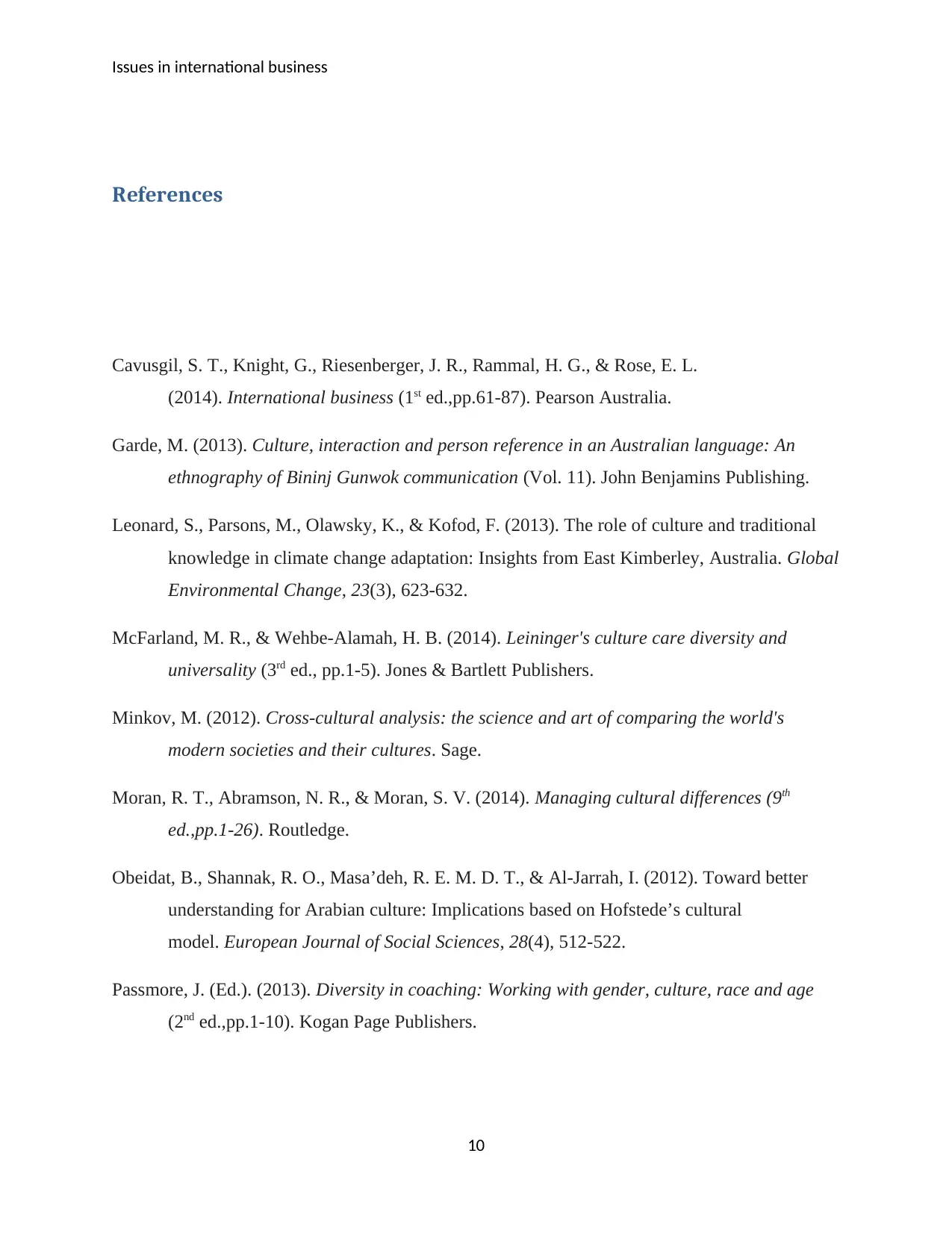
Issues in international business
References
Cavusgil, S. T., Knight, G., Riesenberger, J. R., Rammal, H. G., & Rose, E. L.
(2014). International business (1st ed.,pp.61-87). Pearson Australia.
Garde, M. (2013). Culture, interaction and person reference in an Australian language: An
ethnography of Bininj Gunwok communication (Vol. 11). John Benjamins Publishing.
Leonard, S., Parsons, M., Olawsky, K., & Kofod, F. (2013). The role of culture and traditional
knowledge in climate change adaptation: Insights from East Kimberley, Australia. Global
Environmental Change, 23(3), 623-632.
McFarland, M. R., & Wehbe-Alamah, H. B. (2014). Leininger's culture care diversity and
universality (3rd ed., pp.1-5). Jones & Bartlett Publishers.
Minkov, M. (2012). Cross-cultural analysis: the science and art of comparing the world's
modern societies and their cultures. Sage.
Moran, R. T., Abramson, N. R., & Moran, S. V. (2014). Managing cultural differences (9th
ed.,pp.1-26). Routledge.
Obeidat, B., Shannak, R. O., Masa’deh, R. E. M. D. T., & Al-Jarrah, I. (2012). Toward better
understanding for Arabian culture: Implications based on Hofstede’s cultural
model. European Journal of Social Sciences, 28(4), 512-522.
Passmore, J. (Ed.). (2013). Diversity in coaching: Working with gender, culture, race and age
(2nd ed.,pp.1-10). Kogan Page Publishers.
10
References
Cavusgil, S. T., Knight, G., Riesenberger, J. R., Rammal, H. G., & Rose, E. L.
(2014). International business (1st ed.,pp.61-87). Pearson Australia.
Garde, M. (2013). Culture, interaction and person reference in an Australian language: An
ethnography of Bininj Gunwok communication (Vol. 11). John Benjamins Publishing.
Leonard, S., Parsons, M., Olawsky, K., & Kofod, F. (2013). The role of culture and traditional
knowledge in climate change adaptation: Insights from East Kimberley, Australia. Global
Environmental Change, 23(3), 623-632.
McFarland, M. R., & Wehbe-Alamah, H. B. (2014). Leininger's culture care diversity and
universality (3rd ed., pp.1-5). Jones & Bartlett Publishers.
Minkov, M. (2012). Cross-cultural analysis: the science and art of comparing the world's
modern societies and their cultures. Sage.
Moran, R. T., Abramson, N. R., & Moran, S. V. (2014). Managing cultural differences (9th
ed.,pp.1-26). Routledge.
Obeidat, B., Shannak, R. O., Masa’deh, R. E. M. D. T., & Al-Jarrah, I. (2012). Toward better
understanding for Arabian culture: Implications based on Hofstede’s cultural
model. European Journal of Social Sciences, 28(4), 512-522.
Passmore, J. (Ed.). (2013). Diversity in coaching: Working with gender, culture, race and age
(2nd ed.,pp.1-10). Kogan Page Publishers.
10
Paraphrase This Document
Need a fresh take? Get an instant paraphrase of this document with our AI Paraphraser
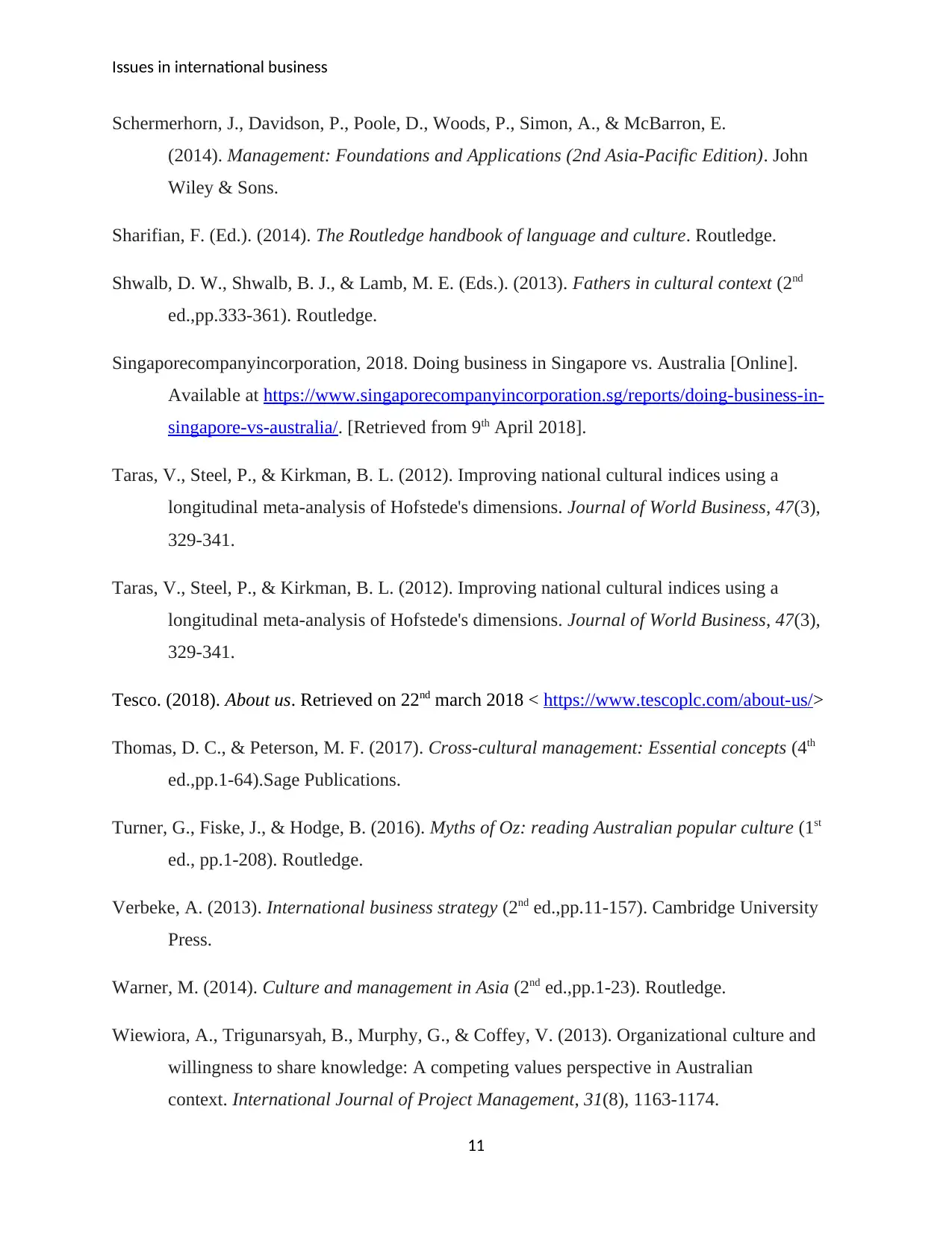
Issues in international business
Schermerhorn, J., Davidson, P., Poole, D., Woods, P., Simon, A., & McBarron, E.
(2014). Management: Foundations and Applications (2nd Asia-Pacific Edition). John
Wiley & Sons.
Sharifian, F. (Ed.). (2014). The Routledge handbook of language and culture. Routledge.
Shwalb, D. W., Shwalb, B. J., & Lamb, M. E. (Eds.). (2013). Fathers in cultural context (2nd
ed.,pp.333-361). Routledge.
Singaporecompanyincorporation, 2018. Doing business in Singapore vs. Australia [Online].
Available at https://www.singaporecompanyincorporation.sg/reports/doing-business-in-
singapore-vs-australia/. [Retrieved from 9th April 2018].
Taras, V., Steel, P., & Kirkman, B. L. (2012). Improving national cultural indices using a
longitudinal meta-analysis of Hofstede's dimensions. Journal of World Business, 47(3),
329-341.
Taras, V., Steel, P., & Kirkman, B. L. (2012). Improving national cultural indices using a
longitudinal meta-analysis of Hofstede's dimensions. Journal of World Business, 47(3),
329-341.
Tesco. (2018). About us. Retrieved on 22nd march 2018 < https://www.tescoplc.com/about-us/>
Thomas, D. C., & Peterson, M. F. (2017). Cross-cultural management: Essential concepts (4th
ed.,pp.1-64).Sage Publications.
Turner, G., Fiske, J., & Hodge, B. (2016). Myths of Oz: reading Australian popular culture (1st
ed., pp.1-208). Routledge.
Verbeke, A. (2013). International business strategy (2nd ed.,pp.11-157). Cambridge University
Press.
Warner, M. (2014). Culture and management in Asia (2nd ed.,pp.1-23). Routledge.
Wiewiora, A., Trigunarsyah, B., Murphy, G., & Coffey, V. (2013). Organizational culture and
willingness to share knowledge: A competing values perspective in Australian
context. International Journal of Project Management, 31(8), 1163-1174.
11
Schermerhorn, J., Davidson, P., Poole, D., Woods, P., Simon, A., & McBarron, E.
(2014). Management: Foundations and Applications (2nd Asia-Pacific Edition). John
Wiley & Sons.
Sharifian, F. (Ed.). (2014). The Routledge handbook of language and culture. Routledge.
Shwalb, D. W., Shwalb, B. J., & Lamb, M. E. (Eds.). (2013). Fathers in cultural context (2nd
ed.,pp.333-361). Routledge.
Singaporecompanyincorporation, 2018. Doing business in Singapore vs. Australia [Online].
Available at https://www.singaporecompanyincorporation.sg/reports/doing-business-in-
singapore-vs-australia/. [Retrieved from 9th April 2018].
Taras, V., Steel, P., & Kirkman, B. L. (2012). Improving national cultural indices using a
longitudinal meta-analysis of Hofstede's dimensions. Journal of World Business, 47(3),
329-341.
Taras, V., Steel, P., & Kirkman, B. L. (2012). Improving national cultural indices using a
longitudinal meta-analysis of Hofstede's dimensions. Journal of World Business, 47(3),
329-341.
Tesco. (2018). About us. Retrieved on 22nd march 2018 < https://www.tescoplc.com/about-us/>
Thomas, D. C., & Peterson, M. F. (2017). Cross-cultural management: Essential concepts (4th
ed.,pp.1-64).Sage Publications.
Turner, G., Fiske, J., & Hodge, B. (2016). Myths of Oz: reading Australian popular culture (1st
ed., pp.1-208). Routledge.
Verbeke, A. (2013). International business strategy (2nd ed.,pp.11-157). Cambridge University
Press.
Warner, M. (2014). Culture and management in Asia (2nd ed.,pp.1-23). Routledge.
Wiewiora, A., Trigunarsyah, B., Murphy, G., & Coffey, V. (2013). Organizational culture and
willingness to share knowledge: A competing values perspective in Australian
context. International Journal of Project Management, 31(8), 1163-1174.
11
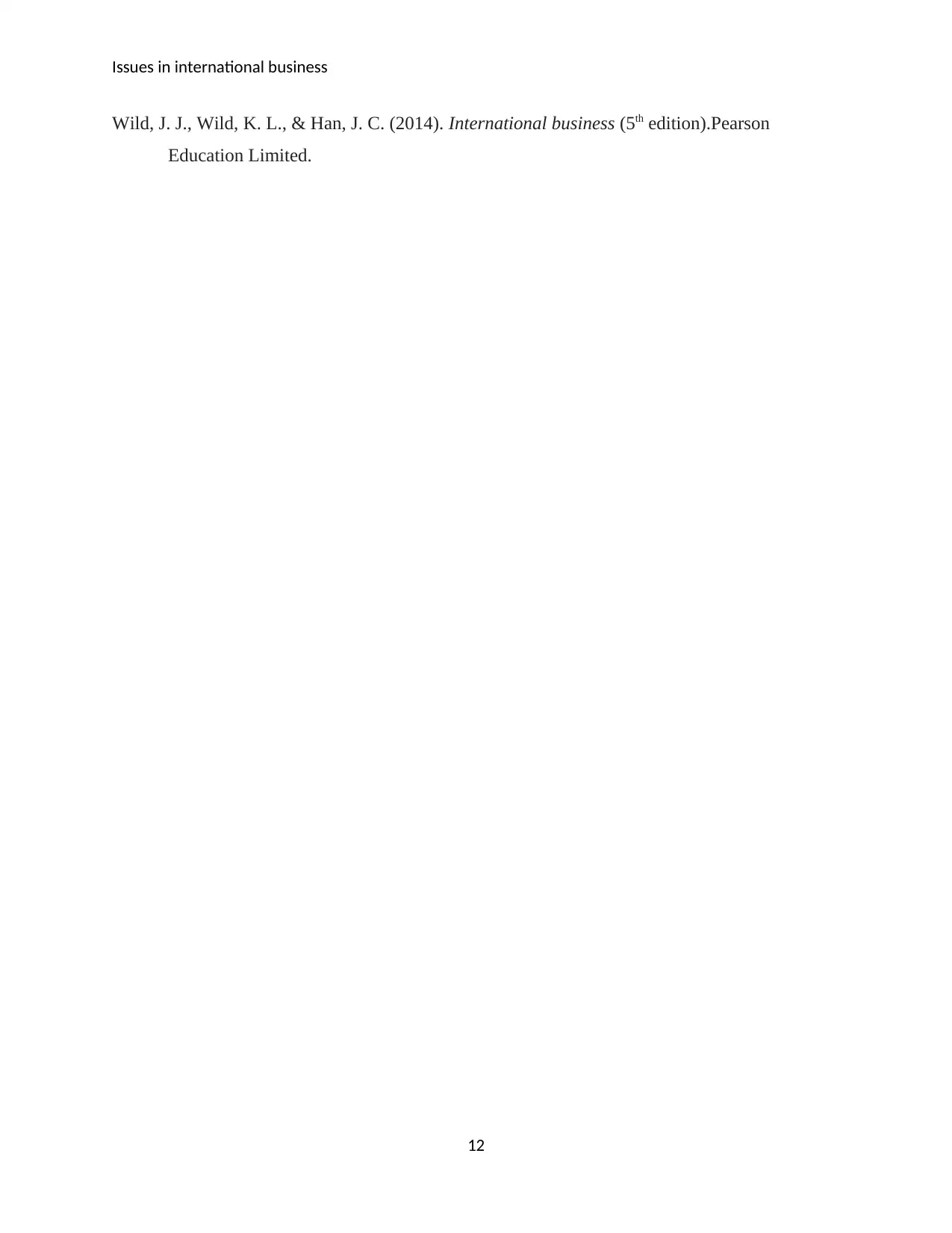
Issues in international business
Wild, J. J., Wild, K. L., & Han, J. C. (2014). International business (5th edition).Pearson
Education Limited.
12
Wild, J. J., Wild, K. L., & Han, J. C. (2014). International business (5th edition).Pearson
Education Limited.
12
⊘ This is a preview!⊘
Do you want full access?
Subscribe today to unlock all pages.

Trusted by 1+ million students worldwide
1 out of 12
Related Documents
Your All-in-One AI-Powered Toolkit for Academic Success.
+13062052269
info@desklib.com
Available 24*7 on WhatsApp / Email
![[object Object]](/_next/static/media/star-bottom.7253800d.svg)
Unlock your academic potential
Copyright © 2020–2025 A2Z Services. All Rights Reserved. Developed and managed by ZUCOL.




